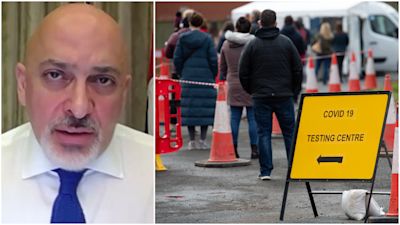Covid roadmap: Indian variant surge could delay June 21 reopening, minister suggests

The June relaxation of coronavirus restrictions could be delayed if a surge of infections caused by the Indian Covid-19 variant is not stopped, the UK's vaccines minister has suggested.
Cases of the new strain, also known as B1.617.2, have more than doubled in a week (from 520 to 1,313) and the government is trying various strategies to avoid a significant spike in deaths.
Asked if the variant has the potential to cause a delay to the planned reopening on June 21, Nadhim Zahawi said: "We take nothing off the table, we will do everything, whatever it takes to bring the infection rates under control."
A campaign of surge testing and genome sequencing (which can identify new variants) is being carried out in a number of areas where the Indian strain has been found in a bid to isolate all cases.
There are "four tests" that must be met before the government decides to take a new step away from lockdown; vaccine rollout, vaccine efficacy, infection rates and mutations.
Mr Zahawi said there is "no evidence" the Indian variant can evade vaccines or is more deadly, but it is understood to be more transmissible - meaning it could cause an exponential rise in infection rates.
The minister said the four tests have already been met ahead of a reopening on Monday, May 17, meaning indoor hospitality can restart next week, along with a number of other reopenings and relaxations.
Vaccines minister on the threat of the Indian variant:
Coronavirus data will be monitored in the four weeks following May 17 and a decision will be taken as to whether the final step out of lockdown can be taken as planned on June 21.
"Hopefully if we all work together it will be positive because we can bare down on this infection, on this variant," Mr Zahawi told ITV News, "but we take nothing off the table".
Surge vaccinations, which would see a particular area targeted with additional jabs, is being considered to reduce infection rates, as is a bringing forward the date for a second dose of vaccine for eligible groups to increase protection.
Mr Johnson said the government was "anxious" about the variant and there is a "range of things we could do, we are ruling nothing out".
He refused to rule out local lockdowns being necessary to contain the spread of the virus.
"There may be things we have to do locally and we will not hesitate to do them if that is the advice we get".
PM refuses to rule out local lockdowns if necessary
Health Secretary Matt Hancock said the situation was being monitored carefully and the government "will not hesitate to take further action if necessary".
Dr Susan Hopkins, Covid-19 strategic response director at PHE, said: "We need to act collectively and responsibly to ensure that variants do not impact on the progress we have all made to drive down levels of Covid-19 and the increased freedom that brings."
She urged people to follow local public health advice, adding: "Cases of this variant are rising in the community and we are continuously monitoring its spread and severity to ensure we take rapid public health action."
In Bolton, which has one of the highest case rates of the variant in the country, mobile testing units have been deployed and door-to-door PCR Covid testing has been offered to 22,000 residents.
A vaccine bus has been set up to increase uptake among those who are eligible and a rapid response team of 100 nurses, public health advisers and environmental health officers has been sent in.
Meanwhile, surge testing has been deployed in Sefton, Merseyside, after cases of the Indian variant were confirmed in the Formby area, with anyone over 16 who lives, works or studies in the area urged to take a PCR test.
Measures have also been brought in elsewhere, including in parts of London.
Mr Hancock said: "We are monitoring the situation very carefully and will not hesitate to take further action if necessary.
"It is imperative we all continue to be vigilant, and if you live in one of the 15 areas where we’ve introduced surge testing, make sure you get a free PCR test.
"And everyone who’s eligible needs to come forward and get a jab."
Coronavirus: What you need to know - listen to the latest episode
PHE said cases of the variant and any clusters are being "rapidly investigated" by local PHE teams, councils and NHS Test and Trace to identify the contacts of those who test positive.
People are being encouraged to go for testing and to self-isolate if needed.
PHE said there were "many small dispersed clusters" in London and it was working with borough councils on a local approach, which had already been effective at driving down variants.